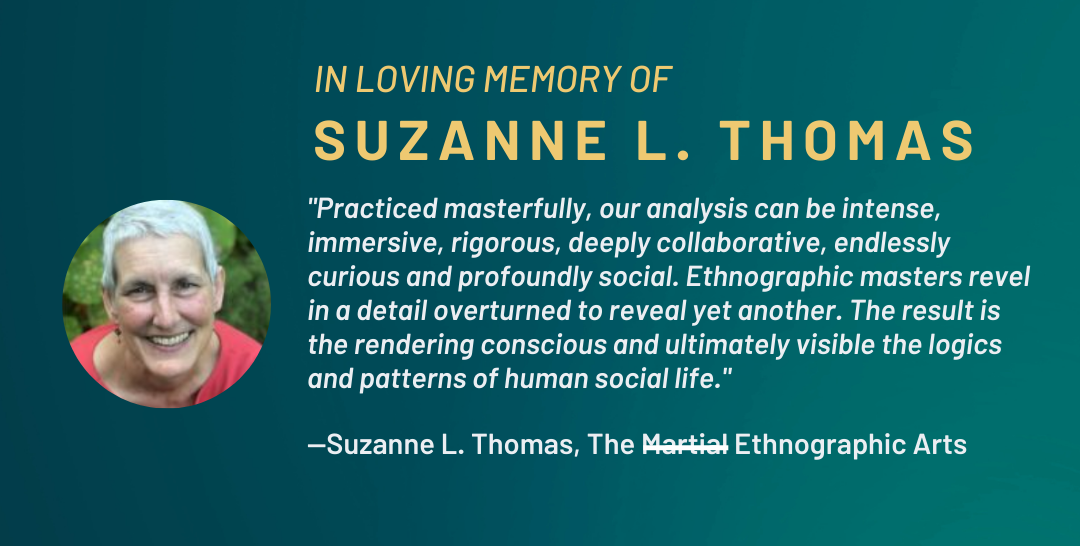“Practiced masterfully, our analysis can be intense, immersive, rigorous, deeply collaborative, endlessly curious and profoundly social. Ethnographic masters revel in a detail overturned to reveal yet another. The result is the rendering conscious and ultimately visible the logics and patterns of human social life.”
—Suzanne L. Thomas, The Martial Ethnographic Arts
We were heartbroken to learn that Suzanne L. Thomas passed away. She was a brilliant ethnographer, joyful collaborator, wise mentor, and caring friend. Whether or not you knew Suzanne, we all stand on her powerful shoulders, and we hope you’ll join us in honoring her.
“There is a Suzanne-shaped hole in my heart right now. I miss her voice, even the ‘HELL-oh’ she started every call with. I miss her nearly absurd attention to detail, and her inclination for a good yarn. I miss her hunger for fieldwork, and her ability to string together projects that on the surface seemed simple enough even an executive could understand, but in reality became a real research corpus that would rival any academic’s tome. I miss her insistence that labor conditions really matter, and the fact that she would not stop until others at least acknowledged that maybe she’s right. I miss her support, and her radical acceptance of all manner of human foibles, especially my own.
“I wish I could tell a Suzanne-shaped story right now with the warmth and humor that she was known for. Alas, the relentlessness of the blank page overwhelms the grieving me, so I’m in no position to conjure those stories. I just don’t have it in me. But I hope you do, because I’d love to see the Suzanne that others saw. So please put your EPIC memories of her in the comments.”
—Dawn Nafus
Suzanne shaped EPIC from its earliest days. At our second-ever conference in 2006, Suzanne’s paper, co-authored with Tony Salvador, boldly elevated three foundational challenges that have animated us for 18 years:
“…the fixation on the individual in corporate research, the emic need to privilege and represent relationships driving the political and cultural economic lived experience, and the pressing need to find useful, effective ways engage corporate structures that otherwise are impervious to ‘views of the collective.'” (Skillful Strategy, and Artful Navigation and Necessary Wrangling)
If the paper exposes her intellectual horsepower, Suzanne’s author bio is a glimpse of her playful spirit:
“Suzanne L. Thomas has been reading Hong Kong martial arts novels and watching too much PRC TV since the mid-1980s. She did more of the same to get her PhD in communications and culture from UCSD. She now works at Intel researching emerging markets in China.”
In 2007, her paper with Xueming Lang connected field and office in the politics of corporate ethnography. And the following year, Suzanne, Xueming and Rogerio de Paula championed the value of ethnography while keeping our critical noses to the grindstone:
“…we must do more than conduct ethnographic research that represents the fields of users and uses. We must change the processes by which such users and uses are defined and touched by corporations. This means going beyond research to play more powerful and extensive roles in business decision-making. It also means subjecting ourselves to the same critical enquiry we apply to the field.” (Taking the Driver’s Seat: Sustaining Critical Enquiry While Becoming a Legitimate Corporate Decision-Maker)
For EPIC2010 in Tokyo, Suzanne wove her martial arts expertise into the special paper on ethnographic arts quoted in the epigraph. And as her leadership rose at Intel and the wider community, her bio that year was still cheeky and classic Suzanne:
“…she has supported her kung fu obsession with better paying work ranging from private sector ethnographic research to managing strategic growth research teams including, of course, ethnographers. Intel currently foots her bill.”
The Tokyo conference was also the first time EPIC included PechaKucha presentations, a format Suzanne cultivated and championed. She mentored, reviewed, and served in countless ways. She did pioneering work on computer vision, algorithms, remote collaboration, and so much more.
You may be just learning about Suzanne’s brilliant and influential work. You may be grieving a friend and dear colleague, more focused on the light she brought to your life than the words she wrote. Either way, we invite you to share your thoughts.

